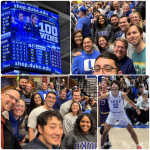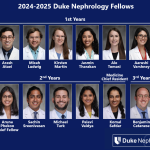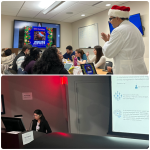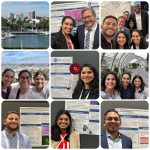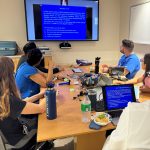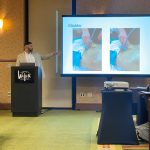Duke and VA Grant and Funding Opportunities
-
Health Services Research and Development (HSR&D) Fellowship
This is a two-year fellowship for established fellows to gain research and teaching skills necessary to become successful investigators. Fellows are provided mentored clinical research as well as formal didactic training through Duke University’s Clinical Research Training Program (CRTP). Courses include knowledge of epidemiology, biostatistics, and management of clinical research.
-
Duke Clinical Research Institute (DCRI)
This fellowship program trains fellows and faculty to become successful clinical researchers. The fellowship provides ongoing and direct mentorship from DCRI research faculty; integration and involvement with clinical trials and outcomes research projects; and access to databases from clinical trials and registry.
-
Duke Training Grant in Nephrology
This is a NIH funded T32 training grant which provides intensive training for postdoctoral fellows in areas that relate to normal kidney physiology as well as the pathogenesis of kidney diseases and hypertension. The long-term goal of the program is to train academic physicians to become basic, translational and clinical scientists with investigative expertise in nephrology and hypertension. Completion of this program permits trainees to pursue careers as academicians conducting high quality research in clinical, translational and basic aspects of nephrology.
-
Duke Clinical & Translational Science Awards (CTSA)
Duke is part of a consortium that includes more than 60 institutions across the country. The Duke CTSA Research Career Development Award Program (Duke CTSA KL2) trains a diverse group of scholars in state-of-the-art clinical and translational research methods. This program is designed to provide young investigators with the knowledge and skills necessary to perform high-impact research and succeed in today’s highly competitive research environment.
Each year, we will select three Duke CTSA KL2 Scholars. Each Scholar will be awarded 75% protected effort for 3 years, $40,000/year for research expenses, and $2,500/year for travel to professional meetings. The KL2 program provides support for a minimum of two years and a maximum of five years of consecutive funding for each scholar, consisting of consecutive 12-month appointments.
Other Funding or Scholarship Opportunities
-
NIH Loan Repayment Program
This program, established through the NIH, assists fellows who are engaged in research. Through the Loan Repayment Program, the NIH may repay up to $35,000 of qualified student loan debt per year for research fellows who commit at least two years to conducting qualified research.
-
American Society of Nephrology (ASN) Fellowship Grants
The goal of the Ben J. Lipps Research Fellowship Program is to fund nephrology fellows to conduct original, meritorious research projects. This program will foster the training of fellows, under the direction of a sponsor, who are highly motivated to make contributions to the understanding of kidney biology and disease. Deadline December 12th. Click here to view past awardees by Duke fellows (Stacy Johnson [2015].
-
American Kidney Fund Clinical Scientist in Nephrology
This one-to-two-year program improves the quality of care provided to kidney patients and promotes clinical nephrology research. It is geared toward nephrologists who desire to pursue an academic career and whose primary professional commitment is scholarship in the provision of patient care. Awardees conduct prevention and outcomes research and receive advanced training in essential skills such as medical ethics, biostatistics and epidemiology. Deadline is December 1. Click here to view past awardees by Duke fellows (Stephen R. Smith [1989-91], Preston Klassen [2000-01], John Stanifer [2015])
Educational Opportunities
-
Clinical Research Training Program (CRTP)
This program, designed for clinical fellows interested in academic careers, offers formal courses in research design, research management, medical genomics and statistical analysis. Students who complete training receive a Masters in Health Sciences (MHS).
-
George Gopen Faculty Workshop on Effective Writing
This is a four-part course presented by George D. Gopen, JD, PhD, Professor of the Practice of Rhetoric, Department of English, Duke University. He acts as a writing consultant to law firms, medical/scientific companies, and government agencies on matters of professional writing. This is an excellent course to help in writing grants and papers. It is open to faculty and fellows.
Hubert-Yeargan Center for Global Health
- The Global Health Residency/Fellowship Pathway (GHRF Pathway) for residents develops academic leaders in global health who work to reduce human suffering caused by health disparities.
How to Find Funding Opportunities
Visit any of the below to look for up to date funding opportunities
- Renal Fellow Network
- National Institutes of Health (NIH)
- Duke’s Office of Research Support Funding Database
- Pivot
- Foundation Directory Online (FDO)
- Grants.gov
- National Science Foundation
- Mentored Career Development Awards
Grant Writing Resources
The Office for Research Mentoring is accepts applications for the Fall Path to Independence Program and K Club. Workshops run through October, with a goal submission to NIH in February.
- Path to Independence Program – ideal if you are applying for NIH R01, R03, or R21
- K Club – ideal for NIH Career Development Award (K Series)
- Grant Templates and Guidance
- The Office for Research Mentoring hosted resource events for SOM faculty
- The Robert J. Lefkowitz Society – Through formal and informal mentoring relationships, the Lefkowitz Society provides promising post-graduate trainees with a greater understanding of how to develop successful academic careers







